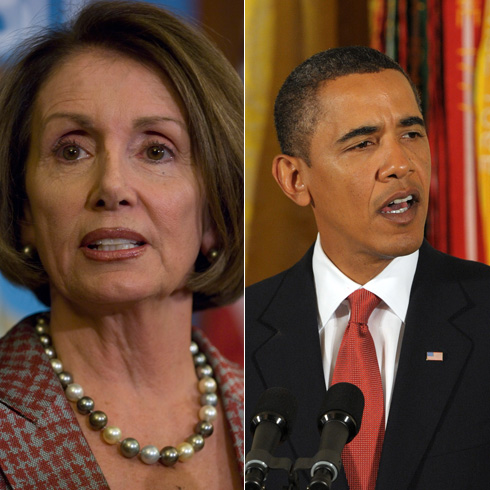For weeks now, we’ve been reporting that there’s a deep divide between the House and Senate on key provisions of the health reform bill. Â The House wants health care to be implemented and regulated at the national level. The Senate wants to leave it up to the states.
The House wants to tax the wealthy to pay for near-universal health care. The Senate wants to shift the burden to the middle class through an excise tax on so-called “Cadillac” insurance plans. (And let’s not forget the House has already given up one of it’s top priorities, the public option, to appease certain senators and end a filibuster threat.)
But now it’s down to crunch time and the House and Senate have to come up with a compromise that can win 218 Democratic votes in the House without upsetting a delicate, filibuster-proof balance in the Senate. And we’re seeing some small progress on one of the main sticking points — the taxes.
Frustrated House progressives have grappled with the Senate (and ostensibly the White House, which supports the Senate plan) over their plan to pay for health care reform. These lawmakers have suggested in no uncertain terms that, without significant changes to it and other measures, they will oppose a final bill.
“If the Senate bill is our final bill, I’d vote against it,” Rep. Anthony Weiner (D-NY) told me outside a Democratic caucus meeting last night.
“There’s some major issues [including] the Cadillac plan,” said Rep. Lynn Woolsey (D-CA), co-chair of the Congressional Progressive Caucus.
Woolsey’s fellow co-chair, Rep. Raul Grijalva (D-AZ) told me “If it’s the Senate version [of the tax], I don’t think the House will [pass it].”
However, as members continue to jockey for position, House leaders and the Obama administration are working overtime, meeting with union officials and each other to figure out how to pay for the bill. By many accounts, the White House is beginning to demonstrate a willingness to modify the tax in a number of ways to make it more palatable to wary House members.
As currently designed, the Senate bill would impose an excise tax of 40 percent on insurance policies priced at over $8000 a year for individuals and $23,000 for families, tied to the consumer price index plus one percent. (This would ensnare a large–and growing–number of middle class Americans and union members, and, as such, has led progressives and labor sympathizers to accuse President Obama of abandoning a campaign promise not to raise taxes except on the wealthy.)
In recent days, though, negotiators have hinted at a number of potential fixes. The threshold values of the policies could be raised; the indexed could be lifted to keep pace with medical inflation; and, as I reported yesterday, collectively bargained health care plans could be exempted from the tax altogether.
None of the changes would be simple, and all would require Democrats to replace the lost revenue, but this is the current approach to resolving the dilemma.
“I don’t know if they’re going to do that,” Weiner told me when I asked him about exempting union plans. “I don’t think they want to make this as transparent as that, and I also think there’s a regional aspect to this too that that doesn’t really help them with. It helps them with the big swath of the country–Ohio, Michigan, Pennsylvania, a lot of Democrats, lot of vulnerable Democrats. But there’s also a lot of us that are in regions of the country that negotiated plans and employer benefit plans are going to fall into this disproportionately.”
“I definitely think there’s increasing support in the caucus for some kind of tax on plans that executives and wealthy people have,” said Rep. Jared Polis (D-CO). “This is one of the few cost-containment measures in the bill, and a lot of us, including myself, feel it’s critical to reduce costs and bend the cost curve to have some element of what President Obama is seeking in the final bill.”
Polis went on, “I think that by maintaining the excise tax in something close to its current form, or the form that President Obama works out with leaders of organized labor, we’ll be able to meet most of the revenue needs of the bill.”
Woolsey wasn’t so sanguine: “It would have to be structured so cleverly,” she said, frustrated.
But if the tax were scaled back just right, her co-chair, Grijalva, says he could back it. “At this point, if we’re dealing with what we have in front of us, I’m not convinced this is history moving forward,” Grijalva told me yesterday. “Given the scenario you’ve just outlined, then perhaps it is a step toward history and many of us would be more inclined.”










